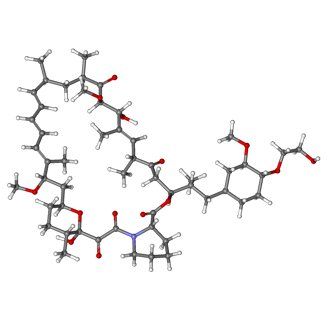Everolimus Active in Thyroid Cancer After Sorafenib Progression
Adding everolimus to sorafenib at the time of progression of advanced radio-iodine refractory differentiated thyroid carcinoma was tolerable and active.
Ball-and-stick model of everolimus

The addition of the mTOR inhibitor everolimus to sorafenib at the time of progression of advanced radio-iodine refractory differentiated thyroid carcinoma was tolerable and active in patients who have progressed on sorafenib alone, according to the results of a poster presentation (abstract 6072) presented at the 2015 American Society of Clinical Oncology (ASCO) Annual Meeting, held May 29 to June 2, in Chicago.
Sorafenib was the first drug approved by the US Food and Drug Administration (FDA) for advanced radioiodine-refractory differentiated thyroid carcinoma in many years. Despite this advance, some patients taking sorafenib will still have disease progression at some sites while maintaining stability at others, possibly due to increased activity of the AKT/mTOR pathway.
In this analysis, Marcia S. Brose, MD, PhD, associate professor of otorhinolaryngology: head and neck surgery at the Hospital of the University of Pennsylvania, and colleagues, sought to test if the addition of everolimus, an oral mTOR inhibitor, would have activity in these patients.
The trial included 35 patients with evidence of disease progression: 17 patients had papillary disease, 9 had Hurthle cell, 1 had follicular, and 6 had poorly differentiated subtypes. Patients received a starting dose of 200 mg sorafenib per day lower than their previously tolerated dose, plus 5 mg per day everolimus. If the patient could tolerate it, the dose was increased to a maximum daily dose of 10 mg per day of everolimus and 800 mg per day or sorafenib; 33 patients were evaluable for efficacy.
The median progression-free survival was 13.9 months, which the researchers said met the primary endpoint of the study.
“We observed that patients overall had minor response, of less than 30% by RECIST criteria,” the researchers wrote. “We noted that most patients went on drug following maximal response to sorafenib alone, and the combination, while able to stabilize or reverse the prior regrowth of tumor on sorafenib alone, did not result in additional tumor shrinkage.”
The researchers said that the addition of everolimus did not result in any dose-limiting hand-foot skin reactions, which had been seen in other similar studies.
Oncology On-The-Go Podcast: ASCO 2023 Recap
June 19th 2023Experts from University of California, Los Angeles Health and Mayo Clinic discuss key data presented at the 2023 American Society of Clinical Oncology (ASCO) Annual Meeting in the gynecologic and gastrointestinal cancer spaces and how they may impact patient care.
Single-Port Robotic Surgery Arrives at Huntsman Cancer Institute
March 6th 2024“Ultimately, we’re going to be able to see more patients, offer more precise surgery more efficiently, and that means just better outcomes for our patients here in the Intermountain West,” said Hilary McCrary, MD, MPH